SAINT CHARLES DE FOUCAULD
9. Béni-Abbès (1901-1903)
ADVANCE GUARD.
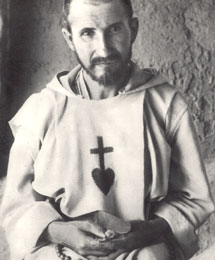
As in 1883, Charles de Foucauld left as a “ lost child ”, not for the expansion of the French Empire, but for Jesus alone, and the expansion of His Kingdom, so that the Sacred Heart might reign over the poor of Algeria, Morocco and the Sahara. Now, on this holy expedition, he is going to encounter the French Army and receive its aid.
Letters of recommendation precede him. Dom Henri, the Prior of Staouéli, writes to Bishop Guérin urging him to welcome this priest and his projects:
« His is the most beautiful soul that I know, and of an incredible generosity. He is taking giant strides along the way of sacrifice, and he has an insatiable desire to dedicate himself to the work of the Redemption of the infidels. He is capable of anything, except perhaps accepting a too narrow direction. The Rev. Dom Martin had no choice but to recommend him to Bishop Livinhac; all I can add is that, having lived for six months in close contact with him, I have always been profoundly edified by his heroic virtue. There is the stuff of several saints in him. His presence alone preaches eloquently, and despite the apparent peculiarity of the mission to which he believes himself to be called, you can welcome him in your apostolic prefecture with perfect security.» (5 Sept. 1901, Lettres à mes frères de la Trappe, p. 201)
Father Huvelin wrote to Bishop Bazin on the 25th August 1901:
« I saw this vocation coming; I saw that it assuaged him, made him more humble, more simple and more obedient. When I told him to set aside this idea as fanciful, he set it aside, but it came back all the stronger and more insistent. In my soul and conscience, I believe that it comes from God [...]. It is nothing strange or extraordinary that impels him, but an irresistible force, a hard instrument for tough labour: That is what Your excellency will find in Monsieur de Foucauld. All the objections that will occur to you, as so often they occurred to me ! I submitted to trial and to long testing. Firmness, a desire to go all the way in love and giving, and to draw all the consequences ; never any discouragement, never ! a little harshness at one time, but now all so much softened ! Let him come at his risk and his peril, see him at work, and judge for yourself. » (Castillon, p. 293 ; Six, p. 269)
On the same day, he wrote to Brother Charles himself :
« Your project, my dear child, seems very fine to me, and immediately practical. I bless it from the bottom of my heart and, by this same post, I am writing to Bishop Bazin. I do so consciously and with real joy.»
Marie de Bondy undertook all the expenses of the journey and of his settling in. The officers of the military posts, stationed from Algiers to Aïn-Sefra, awaited him and celebrated his arrival at every station. He was counting on continuing his journey to the south on foot, but General Cauchemez obliged him take a horse and had him escorted by Lieutenant Huot. The region was still barely docile and Béni-Abbès, an oasis of between twelve hundred and fifteen hundred souls, was one of the outposts of French penetration. Without the Army, he would have incurred the gravest dangers. Several White Fathers had been massacred in the desert.
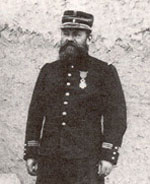
On the 28th October 1901, Father de Foucauld arrived at Béni-Abbès where Captain Regnault, the commandant of the region surrounded by his soldiers, was awaiting him. They were all present at his first Mass, which he celebrated on the 1st of November. That day, he wrote to Father Huvelin:
«Béni-Abbès, the place of my rest. I hope it is from here that my soul will take its leave for the other shore. The journey was visibly blessed by God: the place of Béni-Abbès was also visibly inspired by Him; of all the places I have passed through these last fifteen days, this alone is perfectly suitable regarding site, population, garrison, everything in fact... I received a wonderful welcome here from the officers, the soldiers and the Muslims.» (Correspondance, p. 194)
Captain Regnault showed him every consideration. He ordered a troop to be placed at his disposal; he found him land and had a hermitage built by his men: an oratory, three cells and a guest room. Whilst awaiting the work to be completed, the Father lodged at the Arab Office, a small and barely completed refuge overlooking the palm trees.
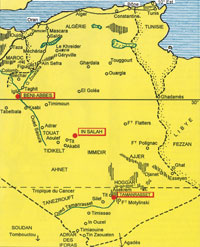 On the 29th November 1901, he wrote to Henry de Castries : « Béni-Abbès is a ksar of a hundred and thirty homes populated (like Beni Goumi and Igli) with Chleuha and Harratin. The Ksar is in the middle of a dense forest of six thousand palm trees watered by a very beautiful feggara, beneath which are beautiful gardens and many other fruit trees; the valley of the Saoura is about two or three kilometres wide here: the oasis is defended on the left flank. »
On the 29th November 1901, he wrote to Henry de Castries : « Béni-Abbès is a ksar of a hundred and thirty homes populated (like Beni Goumi and Igli) with Chleuha and Harratin. The Ksar is in the middle of a dense forest of six thousand palm trees watered by a very beautiful feggara, beneath which are beautiful gardens and many other fruit trees; the valley of the Saoura is about two or three kilometres wide here: the oasis is defended on the left flank. »
He encloses a sketch to show his friend «the position of the refuge, occupied by the Arab Office, the garrison (three companies) and various services ; there is a wonderful view over the valley, its two bends, the hamada, the oasis, the ksar : one can see everything, and it is charming, for the oasis, although only six or seven thousand palm trees, is beautiful on account of its exceptional harmony and shape, the upkeep of its gardens, its air of prosperity... and beyond this peaceful and fresh scene, there is the immense horizon of the hamada [a stony desert, whereas the erg is a sandy desert] lost to view in this beautiful Saharan sky which makes one think of infinity - and of God who is greater still = Allah Akbar?
«As for climate, language, race and customs, Béni-Abbès is just like Ticint, Tatta, Aqqa [Moroccan localities of the Wadi Draa basin]. The population is very gentle; after having greatly feared the arrival of the French, they now appear to be satisfied and admit that for the first time, since time immemorial, they can harvest their crops, which was always donebefore by the Doui Mnia [a nomadic enemy tribe]. » (Lettres à Henry de Castries, p. 111-112)
« THE FATHER OF THE BLED ».
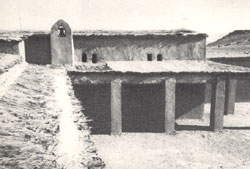
The Father, therefore, arrived in this place with a new kind of missionary project: living «as a solitary cloistered monk, following exactly the Rule of life» which he had drawn up at Nazareth (cf. Anthologie, p. 433 et sq.).
He explains himself to Henry de Castries :
« Pray God, dear friend, that I may do here the work He gives me to do, that I may establish here, through His grace, a little convent of fervent and charitable monks, loving God with all their heart and their neighbour like themselves, a “ zaouia ” of prayer and hospitality whence radiates such piety that the whole country is enlightened and warmed by it. A little family, imitating the virtues of Jesus so perfectly that all around begin to love Jesus. » (12 March 1902, Lettres à Henry de Castries, p. 122)
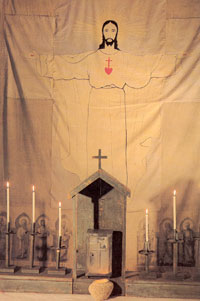
On his arrival at Béni-Abbès, he canonically founds a confraternity of the Sacred Heart. On the back wall of his chapel, he hung a canvas on which he had painted the Blessed Virgin surrounded by saints below and « above, is a full length Sacred Heart, of more or less natural height. The Sacred Heart iinspires repentance with outstretched arms to embrace, to hug, to call all men and to give Himself for all, offering them His Heart. » (7 January 1902, Lettres à Marie de Bondy, p. 95)
The banner of the Sacred Heart flies above the fraternity each day, whilst the Blessed Sacrament is exposed. «It is his entire spirituality, our Father explains. Christ is offering Himself for all on the Cross. Crucified, He gives His Heart as a sign of His merciful Love.» As a priest-monk, living in a real monastery, he takes to heart the enclosure he has established, only exceptionally going out, and every day he sees the population more and more coming to him.
«There is an immense amount of good to do, to both the soldiers and the Muslims» he wrote to Father Huvelin on his arrival, the 1st November 1901.
On the 7th January 1902, he confides to Marie de Bondy:
«I wish to accustom all the inhabitants, Christians, Muslims, Jews and idolaters to regard me as their brother, the universal brother.»
He does not regret the time he devotes to the soldiers. Although distant from religious practice, they become keen on attending the fraternity. «They need me.»
Before long, he will write to Marie de Bondy :
«The good will and unexpected piety of the poor soldiers who surround me allow me to give every evening without exception Benediction of the Blessed Sacrament, after a reading and explanation of the Holy Gospel (I carry on for as long as they want to hear me).» (Castillon, p. 305)
Without knowing it, he also has a great influence on the natives, even though he cannot do much for them.
The Arabs, «are of a harsh and cruel character, fundamentally ill disposed towards the French, obdurate Muslims even though hardly practising their religion», he wrote to Bishop Guérin on the 4th February 1902, «repelling our language and all that comes from us, but obsequious when they think it necessary or useful, and always contemptuous and scornful deep down» (Castillon, ibid.)
Although «“charity hopes for all things”», he has no illusions about them: «The Gospel will not reach them until after it has reached the Berbers and in their wake.»
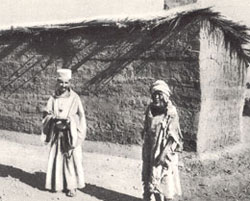
an old disabled person.
The Berbers make up the bulk of the sedentary population. They are generally gentle and peaceful and show themselves to be very favourable to the French, whose language they wish to learn « in order to do business and grow rich » (ibid.).
As pious though not fanatical Muslims, they immediately understand the significance of Father de Foucauld’s arrival at Béni-Abbès and show themselves to be increasingly sympathetic towards him. He places great hopes in them, seeing them « very amenable to being converted in a relatively near future ».
He did not think that anyone would come to his fraternity, but here he is overwhelmed by the poor and the unfortunate. « I am astonished to see myself pass from the contemplative life to the life of the Sacred Ministry, he wrote to his sister on the 14th January. I was led to it despite myself and through the needs of souls. »
« Each Fraternity shelters about twenty Brothers living, not in material isolation, but isolated by silence and enclosure : there, they adore the Blessed Sacrament perpetually exposed : this perpetual exposition and adoration of the Blessed Sacrament, together with a universal and ardent charity for one’s neighbour, and the imitation of the hidden life of Our Lord, is the characteristic, special note of the Little Brothers of the Sacred Heart [...]. In adding that they lead this life above all in mission countries, everything is said. Every detail of their life flows from these three sources. » (Extract from the Rule)
And three weeks later he wrote to Bishop Guérin :
«I am already so much overtaxed with external occupations (although I never leave the enclosure and have been cloistered since the 1st December) that I have not a moment to read a book or to meditate.»
In fact, he has to say Mass at three o’clock in the morning in order to be free after his thanksgiving. « The fraternity is a hive from 5 until 8 in the morning and again from 4 until 8 in the evening. » (12th July 1902, Castillon, p. 307)
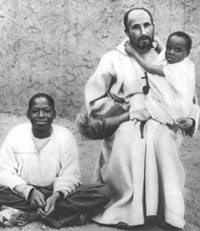
He welcomes travellers, distributes medication and takes in two cripples and an old blind person who does not know where to go. He redeems his first slave on the 9th January. In September, he will redeem Paul, who leaves him, and then returns to stay with him until his death. On a single day, he sees up to twenty slaves, between thirty and forty travellers and up to sixty children, seventy five beggars without counting numerous different visitors! He conquers them all through his goodness. The Muslim marabout of Béni-Abbès calls him “ the Father of the bled”. Father de Foucauld, however, is no fool.
«I have a daily difficulty, for which I ask of you the will and the spirit of Jesus - it is regarding alms: “Give to whoever asks” would be, as you told me and as I see every day, to do more harm than good with this population, so idle, barefaced and mendicant; on the other hand, I am afraid of occasionally dismissing the real poor along with the false, and of not giving enough... One would need to know everyone.» (13 Dec. 1903, Correspondance avec l’abbé Huvelin, p. 216)
In the midst of so many occupations, he writes “The Gospel presented to the poor of the Sahara”, never losing sight of the unique object of all this devotion: above all things, it is Christ Whom he wishes to radiate and to make known.
On the 12th July, he solemnly baptizes little Abd-Jesu. Father Huvelin and Marie de Bondy are his godfather and godmother. But, at the end of 1903 danger looms and life becomes increasingly insecure; even so, he is not discouraged. He still hopes for companions even though the military and civilian authorities have forbidden the arrival of other priests because of the insecurity.
He finds himself alone again and has a foreboding of difficulties ahead. Yet, he now knows perfect joy. He expresses this in letters to his family, to Marie de Bondy, and above all in his letters to Henry de Castries which have become admirably rich, revealing the perfection he has reached. With his friend, he enjoys a trust which enables him to pass freely from geographical detail to the freest mystical outpouring :
«I cannot see Béni-Abbès from the fraternity of the Sacred Heart. There is not a corner of the little plot of land surrounding me, where I live enclosed, whence I can see anything but the desert, which is a joy to me.
«It is so good, my very dear friend, whilst praying with all one’s heart for the men who are on this poor earth (every morning at Mass, every evening at Benediction of the Blessed Sacrament, I remember you very specially), to lift one’s eyes high above it all, to this great sky, the image of the infinite for which we are created.
« What I am telling you occupies little place in my life: it is the fruit of my conversations with the officers... I am very happy... The distant echoes that come from this world’s sadnesses make me look with greater happiness to this homeland of the Church, Bride of Christ, ever more young and beautiful, and towards this homeland of Heaven “where we shall be like God, for we shall see Him as He is”... Of course, one would like to see souls believing and loving, to see these peoples sitting in the shadow of death open their eyes to the great light and to see the reign of goodness, but the wretchedness of creatures cannot obscure that deep happiness in the soul, “inundation of peace” which is born with the thought of the Creator’s changeless, immense and infinite happiness; we “give thanks to His great glory”: we rejoice that God is God...
Dear friend, I repeat: I am happy, extremely happy. Pray for me, who from the depth of his heart prays for you. I am yours respectfully and most devotedly in the Sacred Heart of Jesus.» (5 Nov. 1902, Correspondance avec Henry de Castries, p. 133-134)
HIS “ KHAOUA ”, A NEW KIND OF MONASTERY.
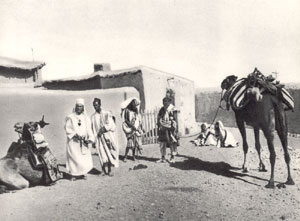 Hospitality was a virtue of the Middle Ages, which has now regrettably died out since the arrival of individualism in the West, but it is still alive in the East. When visiting Morocco, Charles de Foucauld benefited greatly from their hospitality, especially that of the Berbers. It is a memory that left its imprint on his heart. One of his greatest disappointments at Akbès was the lack of hospitality. And so, right from the beginning he gave his monastery this charitable dimension: devotion to the poor and hospitality. He will not go out, but he receives people. In order to avoid all confusion with the Muslim zâwias, he prefers to call his “fraternity” “ Khaoua ”, and he himself takes the name of “ Khouïa Karlo ”, «Brother Charles», so that people can approach him without hindrance and feel welcomed by him.
Hospitality was a virtue of the Middle Ages, which has now regrettably died out since the arrival of individualism in the West, but it is still alive in the East. When visiting Morocco, Charles de Foucauld benefited greatly from their hospitality, especially that of the Berbers. It is a memory that left its imprint on his heart. One of his greatest disappointments at Akbès was the lack of hospitality. And so, right from the beginning he gave his monastery this charitable dimension: devotion to the poor and hospitality. He will not go out, but he receives people. In order to avoid all confusion with the Muslim zâwias, he prefers to call his “fraternity” “ Khaoua ”, and he himself takes the name of “ Khouïa Karlo ”, «Brother Charles», so that people can approach him without hindrance and feel welcomed by him.
His “ Khaoua ” is a new kind of monastery, truly evangelical. Father de Foucauld always lets himself be guided by charity and not by personal choice. Thus, despite the meticulous rule he gave himself, he constantly escapes from the institutional formalism and spirit of security found in certain Orders which can make the monks somewhat indifferent to the world around them. That was the condition of Jesus, and it is also the condition of his poor people who do not know whether they will have bread the next day. For Father de Foucauld, even when the Army guarantees him his bread by supplying him with daily “ slave rations ”, he runs into combat and danger, as we shall soon see, and is ever ready to fall back into the insecurity of the poor surrounding him.
APOSTLE PRIESTS.
« In the midst of all this coming and going, I enjoy an almost infinite peace in the thought of the Unchangeable, the Eternal, so sweet to contemplate, and in which one is lost in an “inundation of peace” as the Bible says. Faced with these vast horizons, I recall these words of the psalm: “Nox illuminatio mea in deliciis meis.” The night of this life has become for me an illumination of delight... I am more happy than I can say, dear friend ! » (To Henry de Castries, 20 March 1903, ibid., p. 137)
But this happiness is always turned towards souls to be saved, and he remains obsessed with the thought of Morocco. He never forgets it for a single instant. In order to understand this, one should read his “Projet de mission au Maroc”. Father de Foucauld is affiliated to the “ Apostle Priests of the Sacred Heart”, and he would like to see those living in the metropolis develop the spirit of apostolic conquest. He is going to try and turn them towards Morocco, where the French Army is about to penetrate; in the footsteps of the legions, the missionaries must follow :
« There are souls who are resolved to accept every sacrifice and who have only one thirst : to glorify Jesus perfectly by imitating and obeying Him perfectly. Such are the souls who will do the work of the Heart of Jesus, who will convert Morocco, and from this victory they will go on to other victories. If apostle priests, burning with this thirst, ready to die with and for Jesus, to lack everything with and for Jesus, wish to join the wretch who is writing to you, let them come here where I have the necessary means to form a little advance party to be thrown into Morocco from the very first day. I humbly ask that apostle priests take the initiative in the conversion of Morocco, and immediately appoint a commission from among them to work for this cause.» (Fr. Georges Gorrée, Au service du Maroc, Charles de Foucauld, Paris, 1939, p. 159-160)
He therefore sees this evangelisation taking place in successive waves of assault: the irregular forces go first as lost children; then the first avant-garde, and only then the bulk of the army: «To begin with, we need orders dedicated purely to adoration of the Blessed Sacrament, to welfare, to contemplation, hospitality and rural works, rather than teaching and preaching orders.» (Ibid.)
The future will confirm this opinion, and seems bound to verify it more and more. Formerly, missionaries were sent who held out their crucifix and began to evangelise the peoples, proclaiming Jesus. It was very good for certain peoples, Caledonians or blacks. With the Muslims, it was a failure, as it was with the Indians apparently. Father de Foucauld’s idea was to send adorers of the Blessed Sacrament first, who would implant Christ’s presence, practising contemplation and hospitality, living a simple life like that of the poorest. Adoration of the divine Host prepares everything; because it draws down graces and disposes people to receive them, showing them that the missionaries are men of God.
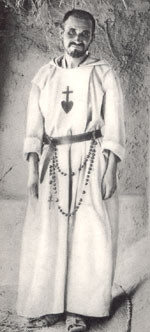 «Welfare and hospitality, the example of the evangelical virtues, above all the prayers and holiness of all those who serve, and still more the great number of Masses and tabernacles, will begin the work of conversion. Once this period has passed, and the more priests and religious established in Morocco the more quickly will this first period pass, then plant all the teaching and preaching orders in this furrow... It is an avant-garde troop ready to work in the fields of Morocco, who, at the foot of the Sacred Host and in the name of the Sacred Heart of Jesus, will dig the first furrow in which the preaching missionaries will then be thrown as soon as possible.
«Welfare and hospitality, the example of the evangelical virtues, above all the prayers and holiness of all those who serve, and still more the great number of Masses and tabernacles, will begin the work of conversion. Once this period has passed, and the more priests and religious established in Morocco the more quickly will this first period pass, then plant all the teaching and preaching orders in this furrow... It is an avant-garde troop ready to work in the fields of Morocco, who, at the foot of the Sacred Host and in the name of the Sacred Heart of Jesus, will dig the first furrow in which the preaching missionaries will then be thrown as soon as possible.
« There are regions there where souls, deprived of the means of salvation fall into hell in droves [...]. Last Christmas, I felt so pressed to take a step forward, that I believed I was obeying the Sacred Heart in calling to prayer those souls whose aid I can hope for in order to start, through a Crusade of prayer, the war against Satan; in so far as I am able, I offered Morocco to the Sacred Heart. » (Ibid., p. 161-162)
He was the only one, alas, for this rather new kind of warfare. He sees this vast Morocco, at last open to penetration, and there is no one there to do the spade work. He laments this, and yet adds: « Despite my desire to have companions, I would rather remain alone than have those who are not truly called by Jesus and not true disciples of His Heart. I asked for three things from those who wish to come:
1° to be ready to give their blood without resistance;
2° to be ready to die of hunger;
3° to obey me despite my unworthiness. » (Ibid., p. 162-163)
CCR n° 294, March 1997